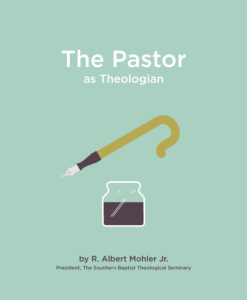Part IV – The pastor as teacher
*Editors note: Read also Part 1, Part 2, and Part 3 of this series. As a theologian, the pastor must be known for what he teaches, as well as for what he knows, affirms and believes. The health of the church depends upon pastors who infuse their congregations with deep biblical and theological conviction. The means of…
*Editors note: Read also Part 1, Part 2, and Part 3 of this series.
As a theologian, the pastor must be known for what he teaches, as well as for what he knows, affirms and believes. The health of the church depends upon pastors who infuse their congregations with deep biblical and theological conviction. The means of this transfer of conviction is the preaching of the Word of God.
We will be hard pressed to define any activity as being more inherently theological than the preaching of God’s Word. The ministry of preaching is an exercise in the theological exposition of Scripture. Congregations that are fed nothing more than ambiguous “principles” supposedly drawn from God’s Word are doomed to spiritual immaturity — which will become visible in compromise, complacency and a host of other spiritual ills.
Why else would the Apostle Paul command Timothy to preach the Word in such solemn and serious terms: “I solemnly charge you in the presence of God and of Christ Jesus, who is to judge the living and the dead, and by His appearing and His kingdom: preach the Word; be ready in season and out of season; reprove, rebuke, exhort, with great patience and instruction” [2 Tim 4:1-2].
As we have already seen, this very text points to the inescapably theological character of ministry. In these preceding verses, Paul specifically ties this theological ministry to the task of preaching — understood to be the pastor’s supreme calling. As Martin Luther rightly affirmed, the preaching of the Word of God is the first mark of the church. Where it is found, there one finds the church. Where it is absent, there is no church, whatever others may claim.
Paul had affirmed Scripture as “inspired by God and profitable for teaching, for reproof, for correction, for training in righteousness” [2 Tim 3:16]. Through the preaching of the Word of God, the congregation is fed substantial theological doctrine directly from the biblical text. Expository preaching is the most effective means of imparting biblical knowledge to the congregation, and thus arming God’s people with deep theological conviction.
In other words, the pastor’s conviction about theological preaching becomes the foundation for the transfer of these convictions into the hearts of God’s people. The divine agent of this transfer is the Holy Spirit, who opens hearts, eyes and ears to hear, understand and receive the Word of God. The preacher’s responsibility is to be clear, specific, systematic and comprehensive in setting out the biblical convictions that are drawn from God’s Word and which, taken together, frame a biblical understanding of the Christian faith and the Christian life.
___________

You can download the complete PDF of The Pastor as Theologian for Free here.
“Every pastor is called to be a theologian. This may come as a surprise to some pastors, who see theology as an academic discipline taken during seminary rather than as an ongoing and central part of the pastoral calling. Nevertheless, the health of the church depends upon its pastors functioning as faithful theologians — teaching, preaching, defending and applying the great doctrines of the faith.”
—R. Albert Mohler Jr.
____________
See Also:
- Albertmohler.com
- Upcoming events featuring R. Albert Mohler Jr.


